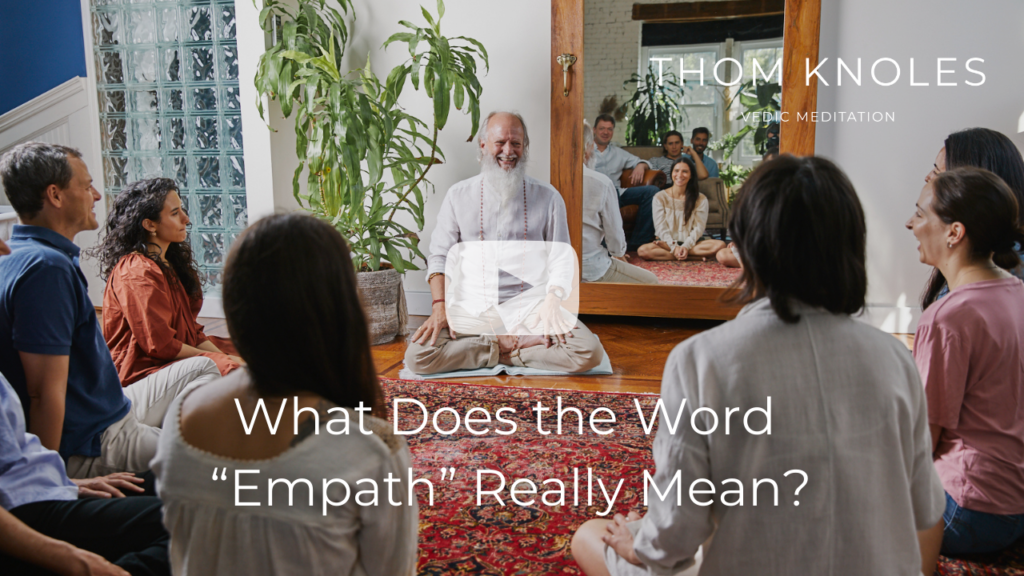Have you ever heard someone say they are “an empath?”
Typically they mean that they feel other people’s feelings, or can be empathetic to others very easily. There are some who even practice what they call “empath meditation.”
But is being an empath real? Is it necessary to practice “empath clearing meditation” or things that are similar? Can one control being an empath?
The truth is, while meditation for empaths can be beneficial, reinforcing the label of “empath” may not actually serve your journey toward higher consciousness. Instead of focusing on managing sensitivity, Vedic Meditation for empaths helps expand awareness, leading to greater peace and resilience.
What does ‘being an empath’ really mean?
As glamorous as it may seem to have special abilities that allow one to psychically tap into someone else’s thoughts and feelings, it’s also misleading. This term, ‘being an empath’ can also be a fancy way to describe certain habits or behaviors that just don’t work:
- Are we ’empaths’ when we experience heightened emotions from taking things personally?
- Are we ’empaths’ when we don’t want to be gracious to people in all stages of the journey toward consciousness… and we ‘can’t handle their negative energy?’
- Are we ’empaths’ when we’re feeling ruled by our emotions, or we don’t yet know how to make healthy boundaries?
While personality differences affect how we experience emotions, labeling oneself as an “empath” doesn’t necessarily lead to a life of less stress, more ease, or deeper fulfillment.
Quite the contrary, “empathic” people often describe themselves as feeling exhausted, feeling drained, or feeling highly sensitive to other people’s energy. Far from living stress-free in the present moment, pursuing Vedic Meditation for empaths offers a powerful way to shift from emotional overwhelm to deep inner stability.
In this video, Thom cautions that labeling oneself as an empath is really about wanting attention. He explains that as we expand our consciousness more and more, we have no need to label ourselves or make sure others know we can do certain things.
Ready to experience the benefits of Vedic Meditation for empaths?
Learn how this effortless practice can transform your emotional well-being today.
Controlling our identity with labels
Along the journey to unbounded consciousness, labels become more and more constraining. When we’re young, we want to be the strong one, the tall one, the class clown, the oldest, or the smartest. We love labels as children. We’re exploring what it means to be a ‘self’. As we grow, we naturally seek labels—introvert, extrovert, leader, empath—to define ourselves. However, the more our consciousness expands, the less useful these labels become. They can limit us rather than empower us.
But as we mature, we discover our strengths and weaknesses naturally. We still like to use labels to feel a sense of place (like salesman, introvert, or “Type A”), but as our consciousness expands, they become less and less useful. The need to create structures that make us feel seen, secure, justified, or better than others is no longer needed. Through Vedic Meditation, we step beyond labels and connect with unbounded awareness, where our sense of self is no longer confined by identity. Instead of defining ourselves as an empath, we simply experience life with clarity, ease, and joy.Through Vedic Meditation, we step beyond labels and connect with unbounded awareness, where our sense of self is no longer confined by identity. Instead of defining ourselves as an empath, we simply experience life with clarity, ease, and joy.
We find that we just are.
The meditator’s path beyond a personal identity
The longer we practice Vedic Meditation, the more we come in contact with unbounded consciousness. Our perceptive abilities grow as our awareness grows, and if we’re truly identifying with unbounded consciousness, we don’t fit into any box or label. When we find we can sense the ‘vibes’ of others… we don’t feel the need to attach extra meaning. That would oppose the experience of unboundedness.
It follows then that even when we can sense others’ emotions acutely, we wouldn’t care about telling others about our special powers with the label of ’empath’.
Freedom from all labels
In fact, the empowerment that comes with total freedom from all labels is absolutely exhilarating. To fully identify with unbounded consciousness is to never have to worry about what we are and what we’re not, or what others think of us. In this place of totality, there’s no need to worry about experiencing other people’s strong emotions. Others’ emotions are a part of the unbounded consciousness like we are.
With the knowledge of the way that consciousness expresses, we don’t fall into the trap of being impressed by others’ shows of ability with energy, emotions, or psychic abilities. We are happy to experience blissful unbounded consciousness each day when we meditate, and approach the new experiences of our expanding awareness with curiosity and openness.
If you feel drained or overwhelmed by emotions, Vedic Meditation offers a path to peace and stability. Instead of resisting emotions, you’ll learn to process them effortlessly, leading to a happier, stress-free life.
Are you ready to experience emotional balance through Vedic Meditation?

